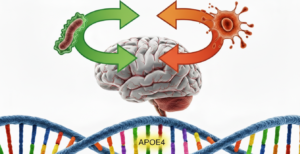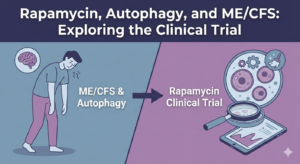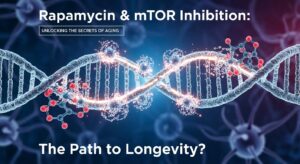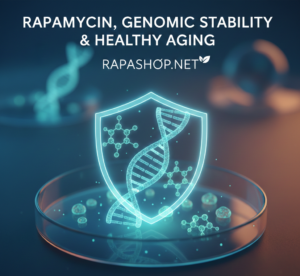mTOR for Aging: Dr. Joan Mannick on Rapamycin & Longevity

Introduction
Dr. Joan Mannick is a medical doctor who has dedicated her career to studying how the body ages. She grew up in a family of doctors and later moved from clinical medicine into research, focusing on ways to help people stay healthier as they grow older. Her work centers on a key biological pathway known as mTOR for aging, which may explain why cells change and decline over time. Researchers increasingly view mTOR as a central switch controlling aging, as explored in depth in this article on mTOR’s role in aging.
In this blog post, we explore a podcast featuring Dr. Mannick’s views on mTOR and rapamycin, and their current and future roles in anti-aging science, a topic that continues to attract growing attention from both researchers and the public.
Mannick’s Early Career and Motivation
Dr. Mannick came from a family where many relatives practiced medicine, teaching her the value of service and persistence. Although she briefly considered law and politics, she felt that becoming a doctor would allow her to help people more directly.
While working in research labs, she saw colleagues move into biotech companies to develop new therapies. Inspired by the opportunity to turn science into real-world treatments, she joined a major biotech firm at age 50, where her focus on mTOR for lifespan research deepened. This shift mirrors broader interest in whether rapamycin could meaningfully extend life, a question examined in detail in Can rapamycin really help you live longer?.
What Is mTOR and Why It Regulates Aging?
mTOR is an evolutionarily conserved protein found in organisms ranging from yeast and worms to flies and mice. It acts as a nutrient-sensing system, switching on when food is abundant and switching off during fasting.
Researchers have repeatedly shown that blocking mTOR—either genetically or with the drug rapamycin—extends lifespan in these organisms. This lifespan extension often comes with improved health, highlighting the role of mTOR for health benefits and positioning it as one of the most validated mechanisms in aging research. Many scientists now refer to mTOR as a hidden regulator of aging, as discussed in Rapamycin and mTOR: could this be the hidden switch controlling aging?.
Multiple laboratories studying different species have confirmed that suppressing mTOR not only increases lifespan but also improves overall healthspan. This growing body of evidence has helped establish rapamycin as a serious candidate in longevity science, explored further in Is rapamycin an effective longevity drug?

Rapamycin: A Drug That Targets mTOR
Rapamycin is a natural compound discovered in the soil of Easter Island. It was first studied as an antifungal agent, but researchers later discovered its ability to suppress T cells—key components of the immune system—leading to its use in organ transplantation.
By inhibiting mTOR, rapamycin activates protective pathways such as mTOR and autophagy, helping cells clear damaged proteins and cellular waste. This mechanism resembles the effects of dietary restriction, which is why many researchers compare rapamycin to fasting-like biology, as explained in Rapamycin mimics the effects of caloric restriction.
More recently, rapamycin has been explored beyond aging alone, including its potential role in immune resilience and emerging therapies, such as rapamycin’s new frontier in long-term HIV immunity.
The Most Explored Organism for Rapamycin Is Humans
While yeast, flies, mice, and aging dogs provide strong evidence for rapamycin’s role in longevity—highlighted by findings from the Dog Aging Project—humans are actually the most studied population.
Rapamycin has been prescribed to thousands of transplant and cancer patients and is currently being tested in clinical trials involving nearly 2,000 older adults. These studies have fueled interest in rapamycin’s broader health effects, including immune aging and women’s health, as discussed in Rapamycin in 2025: surprising new findings on aging, immunity, and women’s health.
Dr. Mannick’s clinical work showed that low-dose mTOR inhibitors improved vaccine responses and reduced infection rates in older adults, reinforcing the importance of mTOR and the immune system in healthy aging.
Why mTOR Matters for Healthy Aging
- Nutrient sensing: mTOR rises with food intake and falls during fasting. With age, this balance is often disrupted.
- Cell cleanup: Reduced mTOR activity supports autophagy, improving cellular repair and resilience.
- Strong evidence: Consistent lifespan benefits across species support the promise of mTOR for lifespan extension, a theme explored further in Rapamycin and longevity science.
Caution and Looking Ahead
Despite encouraging results, there is still no definitive clinical guidance on who should take rapamycin, at what age, or for how long. Long-term trials are still ongoing, and experts caution against unsupervised use, especially as interest grows among biohackers, as noted in Biohackers examine rapamycin as a potential anti-aging drug.
Future studies may explore rapamycin’s effects on heart health, muscle strength, and cognition, expanding its role in healthy aging research, as outlined in What’s next for rapamycin? Inside the new age of longevity research.
Conclusion
Dr. Joan Mannick’s research highlights mTOR for aging as one of the most promising pathways in longevity science. While more clinical data is needed, targeting mTOR may strengthen immune defenses, improve cellular health, and support healthier aging. Until formal guidelines emerge, lifestyle habits such as exercise and balanced nutrition remain essential foundations for long-term health, alongside continued scientific exploration into rapamycin’s future role in longevity medicine.




